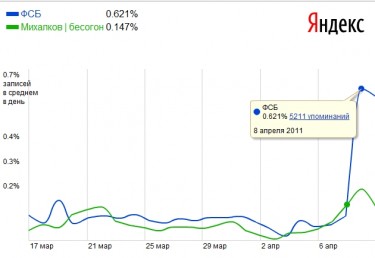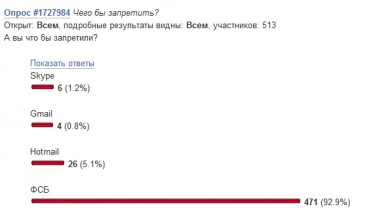It was just a stroke of luck that on Friday, April 8, 2011, LiveJournal did actually work; before and after this date it would constantly “crash” or “die” due to hacker attacks for periods ranging from several hours to half a day. But on this particular Friday it worked, and it’s possible that this saved the Russian Internet and all its users from yet another prohibitive initiative from the FSB (Federal Security Service). At least for the time being.
This is no exaggeration. Had LiveJournal not worked that day, we would probably never have witnessed the many active public skirmishes between the different government departments and nor would we have found out about the latest rift between the Kremlin and the Russian White House, or in other words between Putin and Medvedev.
Saving Skype, and other services
News about the FSB perceiving the Internet voice and video calling service Skype, and Gmail and Hotmail email platforms to be a threat to national security, proposing a ban on them, appeared [ru] on the afternoon of Friday 8.
Friday is a day when media activity falls and news after lunch time can practically go unnoticed. This is a specific characteristic of media space: less news, less traffic, and people with Friday evening and the weekend ahead of them paying less attention to politics than usual.
But this time it was different. Right after this news appeared, it was as if the alarm bells had started to sound; a wave of indignant users on LiveJournal and Twitter rose up. The activity and popularity surrounding this topic exceeded that attained by the recent popular topic of Nikita Mikhalkov [a renowned Russian movie director, however, regulary criticised by the blogger community – GV] nicknamed Besogon (exorcist).
The news was first published [ru] by a journalist from radio station Ekho Moskvy, Vladimir Varfolomeev, on his blog and Twitter account. This was enough to ensure the news was picked up by all the political activists on LiveJournal. The reaction followed straight away and it was tough; it manifested itself in one dominant thought “if the FSB wants to ban Skype and Gmail, then it might as well ban the FSB itself”.
maxim-taranov [ru]:
Граждане России хотят запретить ФСБ, так как не контролируют общение и переписку в данном государственном органе
The vote [ru] was organised across some blogs on the question, “What would you outlaw: Skype, Gmail, Hotmail or the FSB?” Currently, the winning response is the FSB with 93% of the vote.
Bloggers react
Ideally, continuing the idea that the FSB bans popular Internet services, users started to sarcastically advise the special services what they could turn their attention to:
grey-dolphin [ru]:
С точки зрения ФСБ идеальным решением было бы признание самого факта существования граждан в нашей стране угрозой национальной безопасности
oleg-kozyrev [ru]:
Не меньшую озабоченность ФСБ вызывает и способность граждан думать
@zw0rk [ru]:
Товарищи чекисты, вы какие-то недальновидные. Зачем запрещать gmail и skype, когда можно просто запретить простые числа. Сразу станет легче.
Clarifying the authorities’ stance
The Kremlin’s reaction followed swiftly. There were three main ideas in the rebuff [ru] from the Kremlin source: 1. The FSB representative was giving a personal opinion and not that of the government; 2. Skype and Gmail are not threats to Russia’s security; 3. Government policy vis-à-vis the Internet is not determined by special services.
For netizens, the reaction was sufficient to quieten the alarm bells and at any rate the most significant dangers for netizens were addressed. “Hurray! We’ve been saved” blue-olusha wrote [ru] on his Live Journal. However, this happiness was short-lived. Following the stern statement from one side of the double-act came some equally harsh comments from the other.
Dimitri Peskov, the prime minister’s press officer (secretary), made a statement [ru] that the initiative to outlaw Skype and Gmail is an official and heavily promoted position of the FSB, not the personal opinion of a single representative of the Special Services.
After this public “clarification of the relationship” between the Kremlin and the Russian White house, bloggers turned their attention to the hot topic of the past year: is there really a divide in the Putin-Medvedev double-act or is it just a sham? Opinions are split. Some bloggers think these disputes really do exist:
varfolomeev [ru]:
Хоть убейте, но не верю, что и это очередной “спектакль”. Очень похоже на реальные расхождения внутри тандема.
pronkou [ru]:
Можно, конечно, сказать, что многочленный дуумвират в очередной раз устроил «танцы нанайских мальчиков», но мне представляется, что это не так. Медведев смотрит вперед и понимает значение Интернета в развитии страны, Путин смотрит назад и для него Интернет – самый настоящий «дремучий лес».
Other bloggers consider these contradictions to be a facade performed in the “pre-electoral scheming”:
here-it-is-me [ru]:
“Товарищи” по тандему разыгрывают очередную пантомиму-пинг-понг: Я начальник – ты дурак…
zelik64 [ru]:
Крайне забавна эта комедия, которую ломают представители то Белого Дома, Кремля: то прокуратуру с СКП поссорят, то разные мнения Путина и Медведева выдадут, вот теперь – одни сказали – “Воспрещается!”, другие заявляют, мол спокойно, ничего не запретят.
ezhovs [ru]:
Думаю, никто скайп и gmail не запретит. Это означало бы поставить себя на одну доску с Китаем – Россия себе сегодня этого, к счастью, позволить не может. Объяснить инициативу конторы отсебятиной тоже нельзя – слишком высок уровень. Значит, имеет быть место спектакль.
As the topic of the duo’s rift was developed by bloggers, it didn’t appear to go down well with the Kremlin and the Russian White House, insofar as that after a while (just enough for them to discuss the issue and give an order), the representatives of the FSB released an altogether different statement [ru].
Никаких предложений или требований со стороны ФСБ об ограничении для граждан пользования этими сервисами не было», ФСБ лишь «высказала озабоченность» тем, что «ряд серверов оказывают услуги вне рамок правового поля, национального законодательства». Поэтому надо найти такое решение, чтобы «не создать никаких неудобств для простых граждан.
And a little later came yet another statement [ru] from the FSB. This time even more progressive and peaceful: “the development of cutting edge technology is a natural process that we need to facilitate”.
As they say: we started speaking with delight and finished with a sorry sight! First, they call for Skype and Gmail to be outlawed just to turn around and say it was just “a worry”. First, they say these services represent “a threat to security” and later they advocate the development of cutting-edge Internet technology!
Blogger Navalny heavily criticizes [ru] the FSB:
Угрозу безопасности России создаёт джимэйл и скайп, а не то, что сотрудники ФСБ РФ крышуют (и организовывают) всю контрабанду и обналичку в стране. Это ведь сотрудники джимэйла понапихали своих детей и племянников в каждый банк и нефтяную компанию, где им платят огромные зарплаты ни за что.( navalny)
It’s worth noting that the news about the possibility of blocking the popular services highly inflamed bloggers and some even pinpointed the appearance of their civic positions.
kamneejka [ru]:
Или все-таки осмелятся, а тогда остается два шага до официальной цензуры и воронков в ночи. Впервые что-то задело меня до такой степени, что я готова организовывать манифестацию и лезть под дубинки господ полицейских.
Many started to predict that if this happened, it could serve as a strong political mobilising factor for netizens:
Они наверно хотят таки добиться, чтобы народ наконец-то выключил компьютеры и вышел на улицы.
Other bloggers noted that this time the internet-community could assert their freedom:
Когда молчаливо (не все, конечно) согласились, что не должно быть выборов губернаторов. Когда РФ не взорвалась массовыми многотысячными протестами после начавшихся в 2006-м фактических этнических чисток, направленных против грузин. Когда спокойно смотрели на применение «административного ресурса» на выборах… Много было этих когда. А вот теперь “вертикаль” добралась до скайпа – и получила по рукам. Едва ли не в первый раз. Надеюсь, не в последний.
Bloggers’ findings
On the whole, looking at all these stories, bloggers explained some important things. First, they found out about the “officially sanctioned FSB” list of safe resources. The fact is that the security officers acknowledged that using Skype, Gmail and Hotmail with cryptographic features, does not allow the FSB to control correspondence and general users of these services.
At the same time, bloggers realised something unpleasant; Russian email services appear to be “transparent” for the FSB, a surprise for many. The third important thing was that bloggers realised that the freedom the Internet allows is not constant and everlasting and that it can be lost very easily if the FSB suddenly decides to limit Russian citizens’ rights to use international programmes and services “for the sake of the country’s security.”
Incidentally, comments from Google and Hotmail appeared later which demonstrated that, in theory, the FSB should not have any problem accessing correspondence when a request has been made, or, in other words, when it has received the court’s authorisation. Google press office told Gazeta.ru [ru] that “when receiving requests from foreign law-enforcement agencies in accordance with agreements for mutual legal assistance, Google Inc will grant the requested information.”
It’s interesting that on Google website, the information on how many requests were deemed satisfactory by the company can be found. According to this data, last year Google only received 10 requests from Russian special services and none of them were successful (the low quality of preparing this type of documents by Russian special services is well known). However, from the United States for example, they received almost 5,000 requests of which 83% were successful.
Vladimir Mamikin, the director of the informational security of Microsoft’s Russia branch, said [ru]:
Microsoft [it provides access to the Hotmail service] is always open to cooperation with Russian departments of governmental power, especially the FSB. Microsoft’s products regularly bypass the FSB’s certification. Since 2002, in the framework of the Government Security Programme (GSP) Microsoft has represented organisations that are responsible for the improvement of protecting information systems, access to the source codes of their products.
And that’s the FSB’s problem, it appears that it is not the “foreign coding systems” but something different. I think their problem lies in the availability and active influence of the Internet; it is such an uncontrollable platform to exchange information and opinions with which it is impossible to do anything (just shut down).
That is why those stupid initiatives are created and they do not provoke anything but the sarcastic comments of bloggers:
@bilunov: 2017: Google намерен закрыть ФСБ
We wish you all the best, Google.










2 comments
Thanks so much for the translation, I find the conclusions about what Russian security consider to be “safe” particularly interesting. That blocking Skype, Gmail and Hotmail in Russia would even be considered is definitely reason for concern.